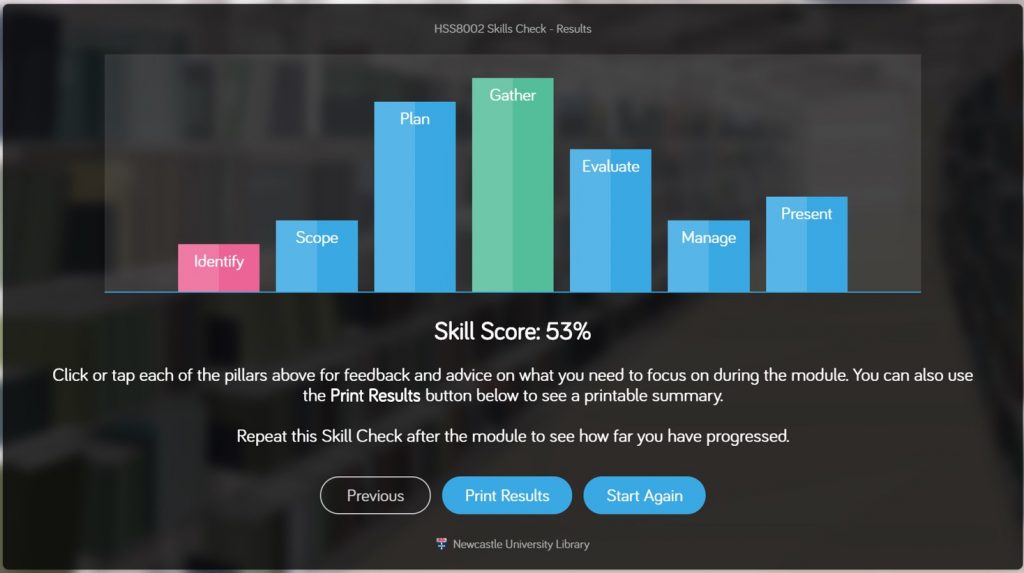Lorna Smith, Liaison Librarian
University Library
What did you do?
We transformed the HSS8002 information and library skills module (part of the HASS PG researcher development programme) from face-to-face delivery into blended (i.e. online and face-to-face) format.
How did you do it?
Lorna Smith from the Library was seconded to lead this project for five months. The project team comprised members of the Library’s HaSS liaison team and LTDS colleagues. The module content has an in-depth focus on information literacy skills (including searching, evaluating and managing information), together with subject specialist information sources and contemporary information issues, including Open Access, Creative Commons, fake news and data management.

FutureLearn Activity Cards
Via a series of project work packages, the team began by auditing, analysing and redesigning the existing module, using Future Learn activity cards.
We then collaborated to create a coherent new online module, with structured week-by-week pathways through the different components. Online content, delivered via Blackboard, features a range of formats, including text, video, audio clips, quizzes, interactive tools, and discussion forums.
To help students develop a tailored pathway through the online content, and measure their progress, we created a diagnostic skills checker for them to self-assess their information literacy skills at the beginning and end of the module.

Skills Checker
To ensure a blended approach, the online content was supplemented by lectures at the start and end of the module, together with a mid-module practical workshop, which enabled students to apply what they had learned online to a practical information-seeking scenario.
The project was informed throughout by student feedback: we gathered views about online learning from the previous year’s HSS8002 cohort, and engaged students to review the online content while it was being developed.
Two factors in particular were crucial to the success of the project: firstly, having a colleague seconded to lead it ensured a well-designed project plan, with momentum maintained and targets met. Secondly, LTDS colleagues’ expertise was invaluable with regard to learning technology and quality control, and they also brought fresh perspectives to a module which had evolved over many years.
Why did you do it?
Around 100 PhD and research masters students take the ten credit module each year, with another 70 or so participating in elements of it for ‘hours-based’ credit.
We had tinkered with the module over many years, but faced persistent challenges in catering for students’ varying levels of information literacy skills, together with highly specialised subject interests and information needs. The logistical difficulties of timetabling workshops for students across an entire faculty during our own busiest teaching period were also frustrating: room and teaching capacity meant that students were not always able to attend their preferred workshops. Finally, the module’s accompanying Blackboard content lacked coherence, and was used largely as a document repository.
As the HaSS Faculty had embarked on a project to move some of its researcher development modules into blended format, we were keen to seize this opportunity to radically rethink and redesign HSS8002 with LTDS support.
Does it work?
We delivered the new blended module for the first time in semester one 2018/19. Evasys qualitative and quantitative feedback showed a marked improvement, with the module getting its highest ever overall ratings, and assessment performance demonstrating a greater understanding of information literacy concepts and search strategy principles. Our online interactions with students on the discussion boards have been insightful, and will help with future development.
Our ‘before and after’ heatmap analysis of the online skills checker shows there was a clear improvement in students’ confidence in those skills for which they had generally indicated low confidence at the start of the module.
We feel the online transformation has created a much more coherent module with a distinctive pathway (it had previously felt more like a series of stand-alone workshops). We are now making much better use of learning technology to bring to life what is quite a skills-based, practical module.
Evasys feedback showed students generally like the blended approach, particularly welcoming the workshop. We intend to develop a more personal and human feel for the module for next year (for example, via talking heads videos)
Overall, the liaison team has learned a great deal from the online project, found it professionally very rewarding, and greatly appreciated working with LTDS colleagues.
We are already repurposing the materials for other subject areas and stages of study, and will be developing a fully online version of the module for London and international delivery in 2019/20.
Interested in finding out more
You can explore the skills checker here https://internal.ncl.ac.uk/ask/hss8002/v1_2/hss8002_skills_check.html
If you would like access to the Blackboard module, or want to find out more, please just email the module team on hss8002contact@newcastle.onmicrosoft.com
Contact details

